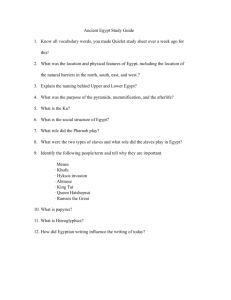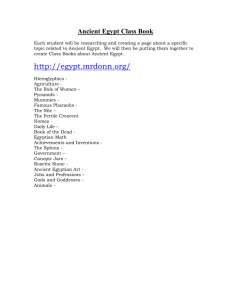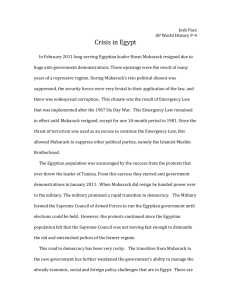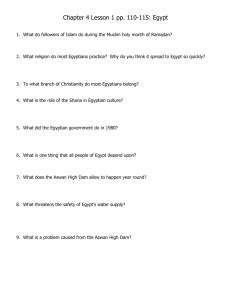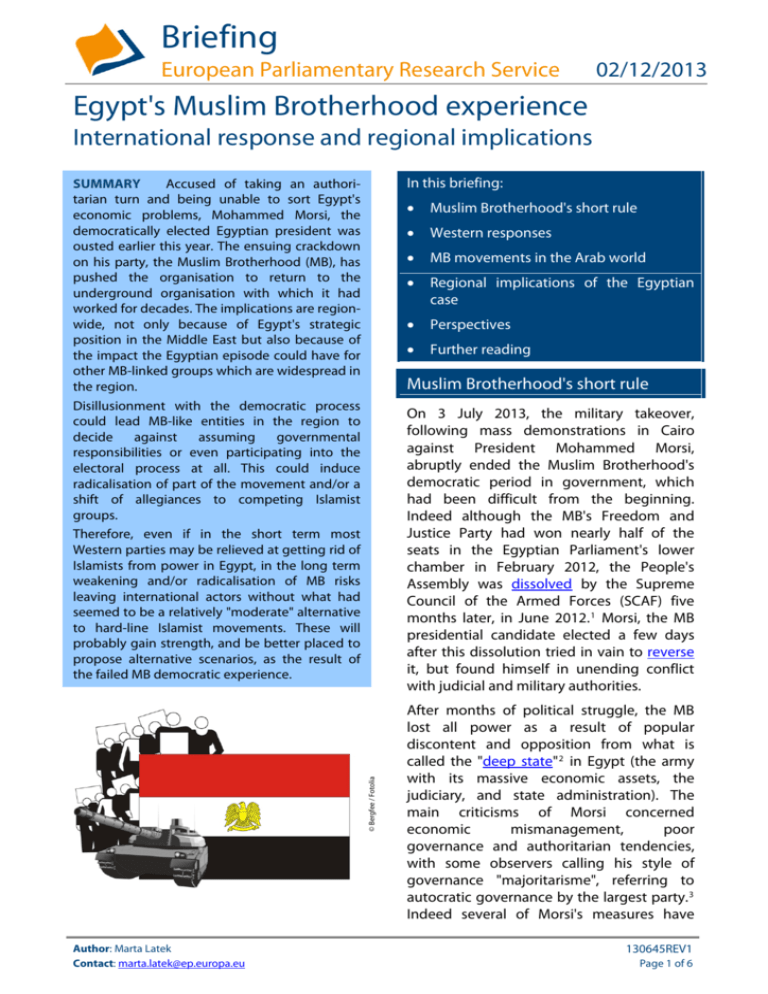
Briefing
European Parliamentary Research Service
02/12/2013
Egypt's Muslim Brotherhood experience
International response and regional implications
In this briefing:
SUMMARY
Accused of taking an authoritarian turn and being unable to sort Egypt's
economic problems, Mohammed Morsi, the
democratically elected Egyptian president was
ousted earlier this year. The ensuing crackdown
on his party, the Muslim Brotherhood (MB), has
pushed the organisation to return to the
underground organisation with which it had
worked for decades. The implications are regionwide, not only because of Egypt's strategic
position in the Middle East but also because of
the impact the Egyptian episode could have for
other MB-linked groups which are widespread in
the region.
Disillusionment with the democratic process
could lead MB-like entities in the region to
decide
against
assuming
governmental
responsibilities or even participating into the
electoral process at all. This could induce
radicalisation of part of the movement and/or a
shift of allegiances to competing Islamist
groups.
Therefore, even if in the short term most
Western parties may be relieved at getting rid of
Islamists from power in Egypt, in the long term
weakening and/or radicalisation of MB risks
leaving international actors without what had
seemed to be a relatively "moderate" alternative
to hard-line Islamist movements. These will
probably gain strength, and be better placed to
propose alternative scenarios, as the result of
the failed MB democratic experience.
Muslim Brotherhood's short rule
Western responses
MB movements in the Arab world
Regional implications of the Egyptian
case
Perspectives
Further reading
Muslim Brotherhood's short rule
On 3 July 2013, the military takeover,
following mass demonstrations in Cairo
against President Mohammed Morsi,
abruptly ended the Muslim Brotherhood's
democratic period in government, which
had been difficult from the beginning.
Indeed although the MB's Freedom and
Justice Party had won nearly half of the
seats in the Egyptian Parliament's lower
chamber in February 2012, the People's
Assembly was dissolved by the Supreme
Council of the Armed Forces (SCAF) five
months later, in June 2012. 1 Morsi, the MB
presidential candidate elected a few days
after this dissolution tried in vain to reverse
it, but found himself in unending conflict
with judicial and military authorities.
© Bergfee / Fotolia
Author: Marta Latek
Contact: marta.latek@ep.europa.eu
After months of political struggle, the MB
lost all power as a result of popular
discontent and opposition from what is
called the "deep state" 2 in Egypt (the army
with its massive economic assets, the
judiciary, and state administration). The
main criticisms of Morsi concerned
economic
mismanagement,
poor
governance and authoritarian tendencies,
with some observers calling his style of
governance "majoritarisme", referring to
autocratic governance by the largest party. 3
Indeed several of Morsi's measures have
130645REV1
Page 1 of 6
Briefing
Egypt's Muslim Brotherhood experience
reinforced the weight of this accusation, for
example, in November 2012, making his
decisions immune from judicial review (a
decree later annulled because of protests),
or nominating 17 MB-affiliated governors in
June 2013.
The interim government, backed by the
army, declared a state of emergency
(supposed to last one month from 14
August, but only ended by court order on 13
November). It has also detained over 2 000
MB supporters and leaders, including
Mohammed Morsi, whose trial started in
November 2013, and frozen assets of its
main
figures. 4
The
pro-Morsi
demonstrations ended in bloodshed with
the number of victims being difficult to
estimate. Media seen as favourable to the
MB were closed and the licences of 55 000
imams sympathetic to the movement
withdrawn. 5 Finally, on 23 September 2013
all activities of the Brotherhood, its NGO and
affiliated groups were banned by court
order and assets seized. Many MB activists
have received prison sentences, as high as
life in jail for several of its leaders.
The revised draft constitution, to be put to a
referendum in January 2014, gives wide
powers to the army, including the right to
try civilians in some cases. In parallel a new
law restricting rights of demonstration and
public protest has been passed, resulting in
police forcibly ending all protests, not only
those organised by the MB.
Western responses
These events have a deep impact on the
region, and place Western partners in a
delicate situation with regard to their
response to what is seen by many as a de
facto military coup, against a democratically
elected president, but by others as the
continuation of a grassroots revolutionary
movement. 6
The European Union
On 29-30 July, during her visit to Cairo, EU
High Representative Catherine Ashton held
Author: Marta Latek
Contact: marta.latek@ep.europa.eu
various meetings with different forces on
the Egyptian political scene, including MB,
but did not succeed in getting them around
the negotiating table. 7 In its conclusions of
21 August 2013, the EU's Foreign Affairs
Council condemned "all acts of violence",
and called upon all parties to engage in "real
and inclusive dialogue" in order to "return to
the path of democracy". It also called on the
Egyptian authorities to end the state of
emergency, and announced the suspension
of all export licences to Egypt covering
goods that could be used for internal
repression.
On 12 September 2013, the European
Parliament adopted a resolution on the
situation in Egypt. The resolution
acknowledges the failure of Morsi's
government to deal with economic issues
and to take into account concerns of all
democratic forces in Egypt. In respect of the
military takeover of 3 July 2013, the EP
condemns the "disproportionate use of
force by Egyptian security forces" and all
acts of terrorism and violence. It stresses
that any ban or exclusion of MB from
political life would only lead to increased
radicalism. MEPs also call upon the interim
government to guarantee freedom of
operation for civil society, trade unions and
media.
The US
The US "strongly condemned" the ongoing
violence in Egypt and argued all parties to
seek resolution of the conflict through
dialogue. As US legislation prohibits
assistance to a country whose elected head
of government has been deposed by
military coup, the use of that term was
avoided by the Obama administration. The
US has cancelled a joint annual military
exercise, but did not immediately halt
military aid, despite voices raised in
Congress in favour of doing so. 8 It was only
on 9 October 2013 that the Obama administration announced the freezing of part of
US aid to Egypt, including a halt in delivery
130645REV1
Page 2 of 6
Briefing
Egypt's Muslim Brotherhood experience
of some heavy weaponry. It stressed that
this step is temporary and subject to
revision if democratic progress is made.
Party, after the end of the Mubarak regime
in 2011, and won the first democratic
elections.
Indeed, Egypt is an important US strategic
partner in the Middle East. American troops
rely on Egypt for preferential use of the Suez
Canal, contingency bases and overflight
rights. However some observers note that
the key US strategic interest, positively
affected by Egypt's change in government,
lies in the preservation of the Gulf
monarchies, which host a large number of
US military facilities and are put at risk by
the rise of pan-Islamic mass movements
such as MB.
Common features
Although the attempt to form a structured
pan-Islamic organisation overseeing the MB
network has failed, some coordination does
take place. It is reported that MB leaders
from 200 countries met in September 2013
in Istanbul and Lahore, in order to adopt a
common strategy to face the Egyptian
crackdown on the MB. 11
As pointed out by some, military aid will
resume, not only because of strategic but
also commercial interests. US arms firms
would lose contracts and joint ventures
financed by US$1.3 billion in annual
assistance. 9
MB movements in the Arab world
Described frequently as the most successful
socio-political movement in the Arab world,
the MB's branches stretch across the region.
Each presents some common ideological
and methodological features, despite the
decentralised character of the network and
its adaptation to local conditions. Although
the MB is often said to have seized the
opportunity offered by the Arab Spring, it is
not seen as its initiator.
Egyptian origins of a global movement
The pan-Muslim movement opposing
secular nationalism was founded in Egypt in
1928, and its ideas and methods spread
quickly to all majority-Muslim countries as
well as to the EU and US.
In Egypt, the MB was banned in the 1950s
and 1960s because of its declared objective
of violent overthrow of the Egyptian
government. It changed its strategy in 1970,
renouncing violence and engaging in a
number of grassroots activities. Used to
acting underground, it re-emerged 10 on the
political scene via its Freedom and Justice
Author: Marta Latek
Contact: marta.latek@ep.europa.eu
One can also distinguish some common MB
characteristics:
Anti-Western ideology
Rooted in Sunni Islam, the MB ideology
rejects the idea of a secular state and blames
Western countries for political colonisation,
resource
exploitation
and
cultural
invasion. 12 However, its willingness to
participate in the democratic process is
regularly asserted. As one commentator
puts it, the "Brothers are torn between
radical politics, and a mode of dealing with
the West and with the democratic system,
that they fear will destroy them".
Gradualism
The MB's historic motto, Islam is the solution,
illustrates its original mission of islamisation
of society, through the implementation of
Sharia law in all aspects of private and public
life. The Islamic state is to be set up at the
end of a progressive and pragmatic road.
Social, educational and health-related
activities are used as the primary tools in this
bottom-up process.
Internal discipline
Although MB has various wings and
currents, the group maintains strong
internal discipline. The majority of the MB
movement has developed a pyramidshaped hierarchy, with centralised decisionmaking
and
decentralised
13
implementation. This, coupled with strong
bonds between its members and a culture
of secrecy and loyalty, enables it to keep a
high degree of organisational cohesion. 14
130645REV1
Page 3 of 6
Briefing
Egypt's Muslim Brotherhood experience
Differences
Position in the political system
MB-inspired entities have different positions
in their respective national political systems.
In some they have been in power (Egypt and
Tunisia until recently, and the Gaza Strip). In
others, they participate in governing
coalitions (Morocco, Algeria). They are in
opposition in Jordan, Iraq and the United
Arabs Emirates (UAE), where MB groups are
subject to government repression, accused
of seeking to export the Arab spring
revolution to the Gulf monarchies. 15 In the
Syrian case, the MB, long operating from
exile, has achieved a strong position, albeit
contested internally, in the Syrian National
Council and the National Coalition of Syrian
Revolutionary and Opposition Forces. These
are intended by the Friends of Syria parties
to lay the groundwork for a government in
exile. The MB is also trying to rebuild its
network in Syria, but faces rapid growth of
independent Salafi militant factions.
Stand on Jihad
The view on the use of violence as a means
to achieve MB goals differs from group to
group. Some MB groups (like in Egypt) have
declared themselves against the use of
violence, although divergences exist
internally and some are still accused of
backing terrorist attacks. Others tolerate
more flexible stances to enable them to
manage all factions. Less frequently, Jihad is
openly acknowledged as a means for
political campaigning. This is the case of
Hamas. In Syria, although MB refuses to
admit to having armed branches, the
organisation sponsors dozens of small
paramilitary units in the country. 16
Finances
The lack of transparency in regard to MB
funding is often denounced. The main
sources of finances seem to be concentrated
in a limited number of backers, as described
in the case of the Egyptian MB:
wealthy diasporas in Gulf states and
Western countries,
Author: Marta Latek
Contact: marta.latek@ep.europa.eu
funds generated by organisations
controlled by MB and members' fees,
Islamic banks,
Recently, Qatar and, in the case of the
Syrian MB, Turkey.
Regional implications of the Egyptian
case
Commentators stress that tremendous
uncertainty surrounds the Arab Middle East
following the Arab Spring uprisings, since
the internal political changes affect the
balance of power in the region. 17 Egypt's
turmoil has added to this uncertainty.
Gulf countries
The fall of the first elected MB leader has
been a relief to the majority of Gulf rulers,
who fear revolutionary contagion spreading
via MB networks, and proposing socially
sensitive bottom-up political Islam as an
alternative to still conservative, but elitist,
Wahhabi-dominated regimes. Just a week
after Morsi's overthrow Saudi Arabia, UAE
and Kuwait pledged a total of US$12 billion
in support to Egypt.
Among Gulf Monarchies, Qatar has taken
almost the complete opposite approach to
the MB. Indeed the Emirate gave financial
support, estimated at US$7.5 billion to
Morsi's Egypt. Since his fall, bilateral
relations have deteriorated: in September
2013, Egypt returned US$2 billion deposited
by Qatar in its Central Bank. The Qatar
exception is explained by its rulers'
immunity to popular challenge (with its
250 000 citizens having the highest per
capita income in the world) and huge
geopolitical ambitions. 18 The implication of
Qatar stepping back from Egypt could lead
to a change in its strategy, and a retreat
from giving strong support to the MB
throughout the region. This could weaken
Hamas and Syrian MB groups financed by
Qatar. 19
Gaza strip/Hamas
For Hamas, the ousting of Morsi, its
strongest ally, was a hard blow, jeopardising
130645REV1
Page 4 of 6
Briefing
Egypt's Muslim Brotherhood experience
its long-term perspectives. In the days
following the events, the Egyptian army
closed the Rafah border crossing, (now
reopened infrequently) and destroyed 80%
of the tunnels that link Gaza with Sinai,
accusing Hamas of being responsible for
security problems in Sinai. 20 Adding to
shortages in supplies for the population, the
closure of tunnels will hurt Hamas itself
financially: taxes on goods delivered via
Israel are transferred to the Palestinian
Authority in Ramallah, with only the "taxes"
on smuggled goods ending up in the Hamas
treasury.
Israel
Since the bilateral peace treaty in 1979
Egypt has become an important factor in
Israeli security. Although Morsi did not break
the pact, he had envisaged renegotiating it.
This, coupled with MB's anti-Semitic
rhetoric, was a source of concern for Israel
for its long-term prospects. Therefore the
Israeli silence on the regime change,
reducing slightly Israel's growing isolation
after the Arab Spring 21 , was a diplomatic
posture hiding overall satisfaction. Israel has
enhanced cooperation with Egypt in order
to secure Sinai, authorisation Egyptian
deployment in the demilitarised zone, in
principle forbidden by the 1979 treaty.
Turkey
Turkey has condemned Morsi's overthrow,
accusing Israel of being behind it and
deploring ambiguous Western reactions
towards what it called "a military coup" that
"destroyed Egypt's fledgling democracy".
Commentators stress that Turkey, together
with Qatar, are the "big losers" of recent
changes in Egypt. Governed by an Islamist
"moderate party", with the army retaining a
strong influence, Turkey had worked hard to
establish the Cairo-Doha-Ankara "prochange" axis in line with its growing
regional power ambitions.
Perspectives
Observers agree that in the short term, there
is little chance of the MB participating in any
potential reconciliation process that would
legitimate what they call "usurpers". 22 This
will enhance the already deep socio-political
polarisation of Egyptian society.
The radicalisation of, at least, parts of MB
movement is often seen as the main result
of Egypt's aborted democratic experiment,
which is also making hard-line Islamic
groups more appealing. In Egypt this
radicalisation could turn into armed
violence against the state and its
commercial interest. This would further
increase the terrorist risk around tourism
assets. 23
In September 2013, the Tunisian MB's ruling
Ennhada party has announced it would step
back from government in a negotiated
arrangement in order to avoid escalation of
political conflict. This suggests that some
MB groups may choose to take a more
conciliatory approach to governance in light
of the Egyptian experience.
Further reading
Egypt: Back to Square one?/ Colombo, S;
Meringolo A, IAI Working Papers 13, 23 July
2013.
Above the state: The Officers’ Republic in Egypt/
Sayigh, Y, Carnegie Endowment for International
Peace, August 2012.
Disclaimer and Copyright
This briefing is a summary of published information and
does not necessarily represent the views of the author or
the European Parliament. The document is exclusively
addressed to the Members and staff of the European
Parliament for their parliamentary work. Links to
information sources within this document may be
inaccessible from locations outside the European
Parliament network. © European Union, 2013. All rights
reserved.
http://www.library.ep.ec
http://libraryeuroparl.wordpress.com
Author: Marta Latek
Contact: marta.latek@ep.europa.eu
130645REV1
Page 5 of 6
Briefing
Egypt's Muslim Brotherhood experience
Endnotes
1
This followed the ruling of the Supreme Constitutional Court that found unconstitutional the electoral law under which the
election had been held. The court ruled that party members should not have been allowed to contest the one-third of seats
designated for independents.
2
Egypt's ‘deep state’ claws back freedoms/ Financial Times, 20 June 2012.
3
Egypt's Muslim Brotherhood/ Laub Z, Council of Foreign Relations, 28 August 2013.
4
Le porte-parole des Frères Musulmans arrêté au Caire/ Le Monde, 17 September 2013.
5
Egypt should preserve unity among disparate parties/ Al Monitor, 15 September 2013.
6
The Army’s coup in Egypt: for the people or against the people?/ Teti A, Gervasio G, Open Democracy 23 July 2013; Egypt: Back
to square one?/ Colomba S, Meringolo A, IAI Working Papers 13, 23 July 2013.
7
Egypt in turmoil: from 2011 revolution to the current crisis/ Kettis A, Briefing Note, Policy Department, European Parliament,
August 2013.,
8
Egypt in crisis: issues for Congress/ Sharp J, CRS Report, Congressional Research Service, 12 September 2013.
9
Why the US won't cut military aid to Egypt/ Marshall S, Foreign Policy, 29 February 2012; The Egypt Aid Dilemma/ Tankel S,
Carnegie Endowment for International Peace, 23 August 2013.
10
MB-affiliated candidates participated as independents in 1984 parliamentary and local elections.
11
Global Muslim Brotherhood organisation holds meetings in Istanbul, Lahore/ Factiva, BBC Monitoring Middle East, 26
September 2013.
12
From prison to palace: the Muslim Brotherhood challenges and responses in post-revolutionary Egypt/ El Houdaiby I, FRIDE,
Working Paper 117, February 2013, pp. 13-14.
13
The structure and funding sources of the Muslim Brotherhood/ The Meir Amit Intelligence and Terrorism Information Centre,
2011.
14
Idem; Struggling to adapt: The Muslim Brotherhood in a New Syria/ Lund A, Carnegie Endowment, May 2013.
15
The Muslim Brotherhood after the Arab Spring: tactics, challenges and future scenarios/ Vidino L, Centre for European Studies,
Policy brief, May 2013.
16
Struggling to adapt: The Muslim Brotherhood in a New Syria/ Lund A, Carnegie Endowment, May 2013, p. 2.
17
The 2011 uprising in the Arab Middle East: political changes and geopolitical implications/ Dalacoura K, International Affairs
88:1, 2012.
18
New emerging balances in the post-Arab Spring world: the Muslim Brotherhood and Gulf monarchies/ Dacrema E, ISPI, January
2013.
19
Qatar geopolitical gamble: how the Gulf state may have overreached/ Walt V; Time.com.
20
Hamas seeks to ease tension with Egypt army/ Amer AA, Al Monitor, 16 September 2013.
21
Geo-strategic consequences of the Arab Spring/ Rózsa E, IE MED Papers 19, June 2013, pp. 25&19.
22
Egypt's Muslim Brotherhood/ Laub Z, Council of Foreign Relations, 28 August 2013.
23
Egypt: factions in Egypt's Muslim Brotherhood likely to turn to armed violence, IHS Global Insight, 19 August 2013.
Author: Marta Latek
Contact: marta.latek@ep.europa.eu
130645REV1
Page 6 of 6



